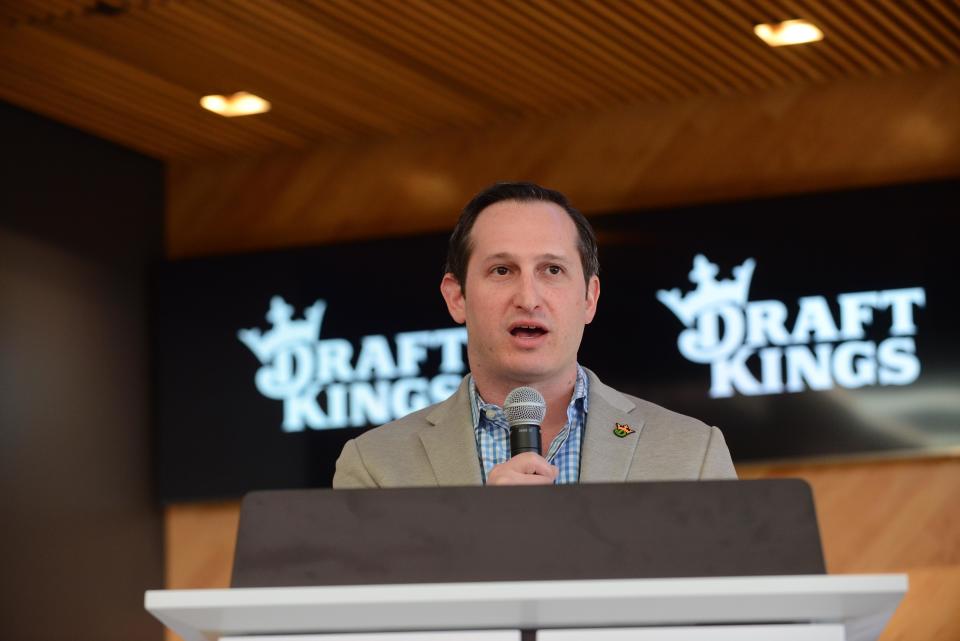DraftKings completes merger that makes it a public company, starts trading Friday
DraftKings, the Boston-based daily fantasy sports company that courted so much controversy a few years ago over whether its contests were a form of gambling, announced Thursday it completed the $3.3 billion merger that will bring the company public. DraftKings has combined with Diamond Eagle, an SPAC (special-purpose acquisition company) that went public last May, which will resume trading on the Nasdaq on Friday under the DraftKings name and the new ticker DKNG.
“It’s a big milestone for us, and I think in many ways some of the things we went through, the different ups and downs and curveballs, make it that much more special,” says DraftKings cofounder and CEO Jason Robins, who will be CEO and chairman of the combined company.

Going public by merging with an SPAC—no road show, no photos on the stock exchange floor, no confetti—may not be what DraftKings employees and investors originally envisioned for the $3 billion tech unicorn. And that was before a global pandemic shut down the entire sports world.
But Robins, in a candid phone interview with Yahoo Finance, says this route has advantages.
In late 2019, before coronavirus was on anyone’s radar, DraftKings was “having a discussion about how the market had been in an 11-year bull run, and it was quite possible with the election approaching that bad news or something could cause a real downturn,” Robins says. “That was a risk of doing a traditional IPO that the SPAC structure protects against.”
Robins also watched the parade of much-hyped unicorn IPOs in 2019 that stumbled out of the gate, including Uber, Lyft, Slack, and Peloton, and the most visible failure, WeWork shelving its IPO entirely. (FanDuel, which predated DraftKings and was seen as its biggest direct competitor, sold to Irish betting company PaddyPower in 2017.)
Diamond Eagle raised $400 million in its offering last May, money that DraftKings now gets to add to its balance sheet at a time when it needs a capital infusion. SBTech, a back-end betting technology provider, is also part of the merger. The combined company will have around $500 million in cash on hand.
“If this were a traditional IPO, forget ringing the bell, I don’t even think we’d be able to close the transaction,” Robins says. “This way, we close the transaction and put another half a billion dollars on the balance sheet at a time when it’s not very easy to raise money. I hope people view this as an innovative thing we did, much in the same way I hope people view us as innovative on the product side.”
Still, the first thought most onlookers will have is that it’s a strange time for a fantasy sports and betting company to go public: no live sports to bet on.
“That’s a temporary thing,” Robins says. “And as long as our customers continue to engage with us, people will be eager to reactivate when sports do come back. We always have people deactivate at the end of the NFL season, reactivate at the start of the season, so there’s always a seasonality to it anyway.”
On the optimism side, many of the paused sports are looking at moving to the fall, which means an extremely crowded September sports schedule: imagine a fall with NFL, NBA, MLB, MLS, NHL, and golf (The Masters has already been re-scheduled for Nov. 12) all happening at once. DraftKings has its fingers crossed for that outcome, but it will also mean preparing for new “operational challenges,” Robins says, like added server capacity and potentially extra customer service staff. (Even with the start of the NFL season in question, the NFL Draft is happening on Thursday, airing on ESPN, ABC, and NFL Network; DraftKings is the official daily fantasy sponsor of the NFL.)
DraftKings is also hoping that because of the toll coronavirus is taking on the U.S. economy, more states that were hesitant about legalizing sports betting will move to do so for the tax revenue benefits. (After the U.S. Supreme Court struck down the federal ban on sports betting in May 2018, 15 states have joined Nevada in legalizing sports betting.)
“We always felt like this was about where this business was going to be over the next several years, not the next several months,” Robins says. “So we’re trying to take a glass-half-full approach.”
—
Daniel Roberts is an editor-at-large at Yahoo Finance. Follow him on Twitter at @readDanwrite.
Read more on how coronavirus is hitting the sports world:
Fanatics sees core parts of its business fall 100% with sports on hold due to coronavirus
Nike, Under Armour, Fanatics and other sports retailers are making coronavirus masks
Nike, Lululemon say they learned lessons from coronavirus closures in China they can apply to U.S.
Coronavirus hits sports leagues: March Madness canceled; NBA, NHL, MLS seasons on hold
